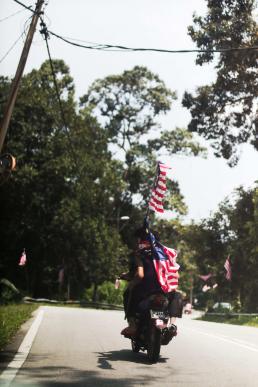For the past three years, I’ve been trying to convince myself that there was something to love about Malaysia. This nation I call home; its people, diversity, history and multiculturalism. This, despite the underlying ethnic and religious tensions. In fact, like many others, I was lulled into a false sense of renewal when Pakatan Harapan took over the administrative reins of the country after the 14th General Election. Here was, it would appear, a new government elected to reject the politics of Barisan Nasional.
But with democratic freedom, comes expression. The renewed sense of voice also invited vocal demands and high expectations. Since last year, we have seen public discourse escalate and become reactionary. The well has been poisoned and the collective voices caricatured. This is partly (social) media misinformation, and partly decades of building tension. But how do you heal old wounds? How do you even begin to address a national traumatic experience (i.e. May 13th 1969) whose root issue was never resolved, but instead exacerbated?

I won’t claim to have the answers. If there were any – greater, wiser men that came before would have been able to solve this existential conundrum long ago. If I cannot offer an answer, at least let me offer a remembrance from Tunku Abdul Rahman’s Independence proclamation in 1957:
Today as new page is turned, and Malaya steps forward to take her rightful place as a free and independent partner in the great community of Nations – a new nation is born and though we fully realise that difficulties and problems lie ahead, we are confident that, with the blessing of God, these difficulties will be overcome and that today’s events, down the avenues of history, will be our inspiration and our guide.
– Tunku Abdul Rahman, 1957
It is comforting to note that even at its conception, there is a tacit understanding that the road ahead would be difficult. Impossible, even. But even with difficulty, hope followed. Hope that things will get better. That despite the mistakes, missteps and conflicts that followed – we would persevere. And if we lost our way: self-correct. And this was the foresight of our forefathers, many who have passed and left the fate of the nation in the hands of the generations after them.
Over the years, my work offered me the opportunity to engage with the various facets of Malaysian life. What struck me most was how removed every Malaysian life was from the (dramatic) political discourse that dominated media headlines. Often, the conversations I shared were received with open-mindedness. Maybe some (ideological) disagreements, but it was never underscored by malice nor hatred. Malaysians, I think, especially those outside the Klang Valley that we often disregard, want only to live together – and live in peace, with enough food to put on the table. Ensuring that their children and community become positive contributors to society.
There’s a great deal more to lose with conflict and distrust than there is with co-operation and compromise. And deep down, I would like to believe we all know that. This nation was founded on the principle of compromise. The postcolonial legacy of the British in fact necessitates it. Compromise indicates a willingness to negotiate and chart a co-existence, despite differences. To reach this space, however, requires an acknowledgement of our collective pain and distrust. The most difficult of conversations are the ones that are most raw – compressed decades of perceived victimhood and feelings of exclusion.
Very often, we’re unwilling to have this conversation. Because like trauma, there is fear for a trigger. And with national trauma, there is often the fear of violent retaliation. But like any difficult conversation – conflict and discomfort are necessary, if not good. A laborious process to transform the I into a we. To solve our problems collectively, instead of separately. While closure may not offer resolution or even a viable action – it at least gives us a place to work from. To get there, however, we first need to talk to each other. The thing is, I think we’ve forgotten how to do that for a long time now.
Selamat Merdeka ke-62.